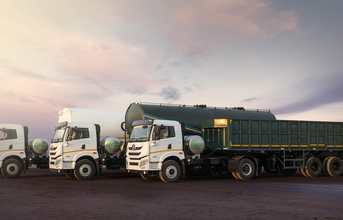
Blue Energy Motors, a pioneer in green truck manufacturing, is celebrating the International Day of Clean Energy on January 26, coinciding with India's Republic Day, by highlighting a significant milestone as its fleet of trucks has successfully prevented over 2500 tonnes of CO2 emissions since its inception. This amounts to approximate 30 per cent reduction of emissions from the air, an accomplishment that symbolises a tangible contribution towards a cleaner environment, a reduced carbon footprint, and a sustainable future.
In India, the logistics sector is the third-most CO2-emitting sector, with about 14 per cent share of emissions. Within logistics, heavy trucking contributes to 45 per cent of total CO2 emissions. To address this challenge, zero-emission trucks (LNG or battery-operated) have the potential to cut down at least 2.8-3.8 gigatonnes of CO2 emissions between present to 2050. Aligned with this idea, Blue Energy Motors' commitment to decarbonisation has created a significant impact, equivalent to the positive environmental impact of CO2 absorption by 1,00,000 trees in one year.
Anirudh Bhuwalka, CEO, Blue Energy Motors, said, "Surpassing 2500 tonnes of CO2 emission reduction by our LNG truck fleet is a milestone that underscores our commitment to decarbonising the industry and contributing to India's sustainability targets. By leveraging alternate fuel technologies, we aim to set a transformative example for the industry by preventing the emission of over 1 million tonnes of CO2 in the next 5 years, extending our commitment beyond numbers to foster environmental responsibility."
The emission reduction statistics of LNG trucks highlight their environmental impact, with a notable 30 per cent decrease in CO2 emissions compared to their diesel counterparts. Additionally, these trucks contribute to a cleaner atmosphere by reducing noise pollution by up to 30 per cent, carbon monoxide by up to 70 per cent, sulphur oxide by up to 100 per cent, nitrogen oxide by up to 59 per cent, and particulate matter by up to 98 per cent. A single LNG truck, covering an average distance of 80,000 km in a year, can significantly cut down emissions, showcasing the tangible benefits of this green transportation solution.
Shifting to green trucks can cut down CO2 emissions, lessening the adverse impact of commercial vehicles on our environment. While in 2023 greenhouse gas emission rates emitted for every unit increase of gross domestic product (GDP) has dropped by 33 per cent in 14 years due to the use of renewable energy and reforestation, adopting green trucking will further help reduce these emissions from logistics and transportation industry.



























